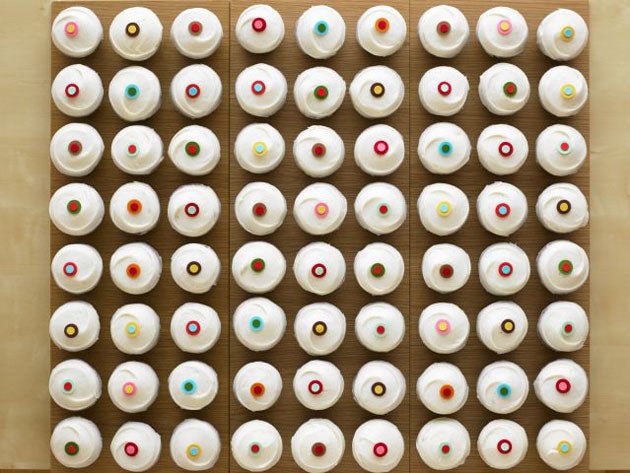They are America's biggest food craze since gourmet coffee. Now frosted cupcakes have cemented their standing as a staple of the national diet – by tapping into the business community's insatiable appetite for legal disputes.
Sprinkles, the cupcake chain based in Beverly Hills, whose celebrity patrons include such opinion-formers as Oprah Winfrey and Tom Cruise, has launched a series of trademark battles against rivals attempting to break into its lucrative market. In what local news outlets are calling the "cupcake wars", Sprinkles has sent half a dozen cease-and-desist letters to competitors, and filed three lawsuits. It accuses rivals of copying the design of its sugary products and infringing its trademarked name.
At the new Sprinkled Pink Cupcake Couture store in Montecito, near Santa Barbara, the owner, Wendy Jones, received a lawyer's letter last week, just one day after opening her doors. It demanded that she drop the verb "sprinkle" from her signage.
"They're going too far," she told the Los Angeles Times. "I'm sure they're protecting themselves, but there's a whole big United States out there. There's room for other cupcake shops. They shouldn't be bullying around or picking on little people like us ... I really, honestly, don't think they invented the cupcake."
Famous Cupcakes in North Hollywood was sued last month for using coloured "dots" on the top of its icing. According to Sprinkles, they resembled the trademarked "modern dot" which it uses to differentiate between different flavours of cakes.
The dispute may sound delightfully petty, but a highly-lucrative industry's future is at stake. The cupcake craze began roughly five years ago, when stars of the television show Sex and the City became patrons of Manhattan's now-famous Magnolia bakery.
In 2005, the trend spread to California with the opening of the first Sprinkles in Beverly Hills. It gained momentum when Barbra Streisand sent a tray of cakes to Winfrey, who featured them on her show.
Widespread celebrity endorsement followed. Courtney Love soon complained they'd caused her to gain 10lb. Teri Hatcher, Kevin Bacon and Serena Williams were seen queuing at the Sprinkles counter.
Most cupcake stores sell a beefed-up American version of the traditional English fairy cake. Each costs between $3 (£1.70) and $5, measures four or five inches in diameter, and contains a variety of sugary toppings and fillings. Flavours range from "peanut butter and chocolate ganache" to "red velvet with cream cheese".
There are now about 1,000 specialist stores in the US, but no pre-eminent national chain has yet emerged. Lawyers for Sprinkles, which has ambitious expansion plans, claim this explains their aggressive brand protection.
"The law says that if you're a trademark owner, you have a duty to enforce your rights," said their attorney, John Slafsky. "These are small-business people themselves. They've worked really, really hard to build a successful business, and it's frustrating for them when other folks feel comfortable copying their original creations and their original brands."
Ultimately, the industry's future may lie in whether any firm can lay claim to the verb "sprinkle," according to Doug Lichtman, a UCLA law professor. A court may also have to decide if the "modern dot" on Sprinkles cakes really does set it apart from its rivals.
"It might be that, from the perspective of a cupcake customer, the 'modern dot' simply looks like one of several traditional allocations of frosting," he said. "That might make the mouth water, but it would not warrant legal protection."
A brief history of the cake in a cup
US celebrities may have fuelled the modern obsession with the cupcake but it dates back to a time when the likes of Hummingbird and Sprinkles were a mere glint in a baker's eye.
In 18th-century America, harried housewives apparently saved time by measuring cake ingredients in cups rather than by weight. The ovens of the day also meant larger cakes took an age to bake and burnt easily.
This explains the "cup" name but some preferred to call the treats "number" or "1234" cakes because of the proportions required to bake one (generally, one cup of butter, two of sugar, three of flour and four eggs, plus a cup of milk and a spoonful of soda).
The earliest recipe for a cupcake appears in American Cookery by Amelia Simmons, the first American cookbook (1796): "A light Cake to bake in small cups: Half a pound sugar, half a pound butter, rubbed into two pounds flour, one glass wine, one do. Rosewater, two do. Emptins, a nutmeg, cinnamon and currants."
Subscribe to Independent Premium to bookmark this article
Want to bookmark your favourite articles and stories to read or reference later? Start your Independent Premium subscription today.


Join our commenting forum
Join thought-provoking conversations, follow other Independent readers and see their replies